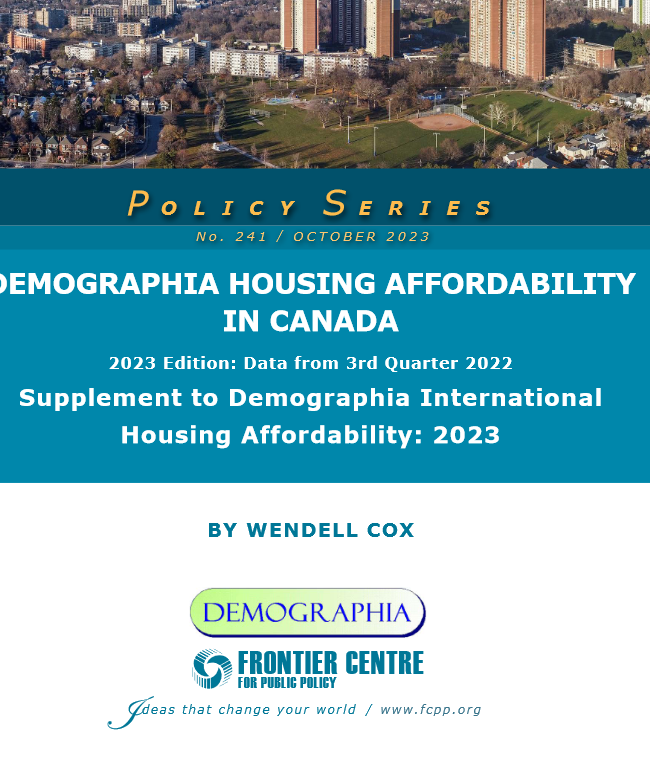WINNIPEG Oct 11, 2023 – The Frontier Centre for Public Policy’s Demographia Housing Affordability in Canada report, released today, cast a spotlight on the pressing issue of housing affordability in Canada. This comprehensive report offers a detailed analysis of middle-income housing affordability during the third quarter of 2022, focusing on 46 housing markets referred to as census metropolitan areas.
The report goes beyond the conventional analysis of property prices, delving into the intricate interplay between house prices and income. Price-to-income ratios, a crucial metric for assessing housing affordability, have gained global recognition. Esteemed institutions, including the World Bank, United Nations, OECD, and IMF, have endorsed this measurement. The Frontier Centre for Public Policy’s housing affordability index adopts a similar approach, utilizing the “median multiple” calculation. This calculation involves dividing the median house price by pre-tax median household income.
The report sheds light on the historical context of housing affordability within Canada’s six major markets – Vancouver, Calgary, Edmonton, Toronto, Montreal, and Ottawa – each with populations surpassing one million. The period from 1970 to the mid-2000s witnessed relative stability in the housing affordability landscape. However, by 2005, Vancouver's market initiated a significant shift towards unaffordability, a trend that has only intensified since the mid-2000s.
The year 2022 marked a concerning increase in “severely unaffordable” housing markets, extending beyond the scope of the six major markets. The number of severely unaffordable markets surged from 18 in 2019 to 24 among the surveyed 46 markets. In contrast, the count of “affordable” markets dwindled from eight in 2019 to a mere three.
The advent of remote work, or “telecommuting” during the pandemic led to a surge in households seeking more spacious living spaces. This surge in demand outpaced supply, resulting in a “demand shock” that further exacerbated the challenges of housing affordability.
The epicentre of unaffordable housing primarily lies in British Columbia and Ontario. Notably, Vancouver and Toronto emerged as the most severely unaffordable major markets, ranking third and 10th least affordable among 94 markets in Demographia’s International Housing Affordability Report 2022. This phenomenon extended beyond Vancouver, impacting other markets in British Columbia. Similarly, the trend reached markets beyond Toronto, prompting a net interprovincial migration as households pursued more affordable housing options.
Amidst these challenges, four markets – Moose Jaw (SK), Fort McMurray (AB), Saguenay (QC), and Fredericton (NB) – have managed to uphold their affordability. The Canadian housing market faces intensified scrutiny, with analyses highlighting the formidable task of addressing the nation’s housing crisis. This includes restoring affordability and enabling home ownership amidst obstacles such as the scale of the issue and the capacity of the home-building sector.
At the heart of the crisis lies urban containment regulation, which has driven land prices to unsustainable levels, constraining housing supply for middle income households. This scenario arises from the deliberate intent of urban containment policies to inflate land prices. Disparities in land costs across markets play a pivotal role in housing affordability disparities. Government policies, like urban containment, unintentionally contribute to government-induced inequality by inflating land prices. Practical alternatives exist to revitalize housing affordability.
Migration to more affordable housing markets has become a priority for many, as evidenced by an unprecedented population shift away from major metropolitan areas towards regions with more affordable housing options. Ensuring affordability remains in these markets is pivotal. Neglecting this could lead to replicating the ongoing affordability crisis in regions that are currently more affordable, which could limit opportunities for future generations and impact Canada’s attractiveness as an international migration destination.
For media inquiries, please contact:
Wendell Cox
Senior Fellow
Frontier Centre for Public Policy
demographia@gmail.com
David Leis
VP Development and Engagement
david.leis@fcpp.org
604-864-1275
About the Frontier Centre for Public Policy The Frontier Centre for Public Policy is an independent, non-partisan think tank that conducts research and analysis on a wide range of public policy issues. Committed to promoting economic freedom, individual liberty, and responsible governance, the Centre aims to contribute to informed public debates and shape effective policies that benefit Canadians.
Wendell Cox is a Senior Fellow at the Frontier Centre for Public Policy. He is principal of Demographia.com, author of Demographia World Urban Areas and an author of Demographia International Housing Affordability (19 annual editions) and Demographia World Urban Areas. He earned a BA in Government from California State University, Los Angeles and an MBA from Pepperdine University. He served as a visiting professor at the Conservatoire des Arts et Metiers in Paris, a national university.



